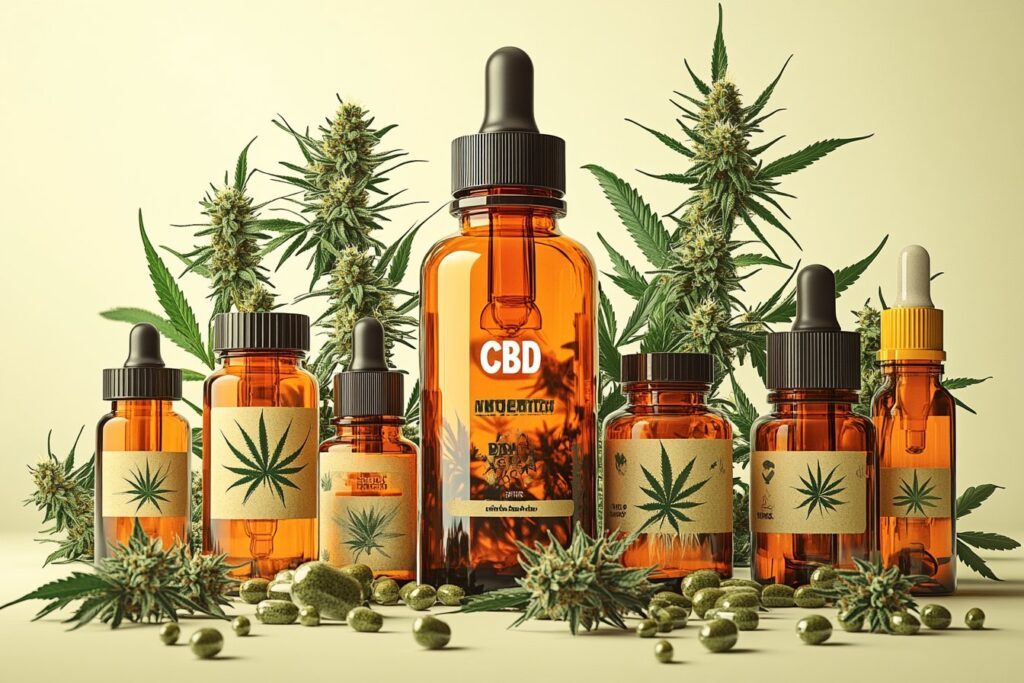The world of wellness has been abuzz with the talk about cannabidiol (CBD). This natural remedy has garnered attention from scientists and the general public alike. But what exactly is CBD, and why is it so popular? In this article, we will break down everything you need to know about this fascinating substance.
What is CBD?
CBD stands for cannabidiol, which is one of the many chemical compounds found in the cannabis plant. Unlike its famous cousin THC (tetrahydrocannabinol), which is a psychoactive ingredient that gets people “high,” CBD is a nonintoxicating substance. It means you can reap its benefits without the mind-altering effects associated with marijuana.
This active ingredient is typically extracted from the hemp plant, a variety of cannabis that contains low levels of THC. The extraction process can involve various methods such as CO2 extraction or oil infusion. Once extracted, CBD is often mixed with a carrier oil like coconut or hemp seed oil to create CBD oil, which is then used in various products ranging from tinctures to topical creams.
The history of CBD
Early uses
Humankind has used cannabis plants for thousands of years. Historical records show that ancient civilizations were aware of its medicinal properties. For instance, ancient Chinese texts mention using hemp plants for healing purposes as early as 2900 B.C. Similarly, ancient Indians documented the use of cannabis for medicinal purposes in texts dating back to 1000 B.C.
Modern discovery
The modern discovery of CBD began in the early 20th century when researchers started isolating individual cannabinoids from the cannabis plant. In 1940, Dr. Roger Adams successfully isolated CBD, although its structure wasn’t fully understood until later. Throughout the latter half of the 20th century, research into the beneficial pharmacological effects of CBD continued to grow, leading to the booming interest we see today.
How does CBD work?
To understand how CBD works, it’s essential to grasp the basics of the endocannabinoid system (ECS). This complex system in our bodies helps regulate various physiological processes, including mood, pain sensation, and immune response. The ECS is composed of receptors, endogenous cannabinoids (produced naturally by our body), and enzymes responsible for their production and degradation.
CBD interacts with the ECS but doesn’t bind directly to its receptors like THC does. Instead, it modulates these receptors, influencing how they respond to different stimuli. This modulation helps maintain balance, enhancing overall well-being. Another interesting aspect of CBD is its ability to interact with non-cannabinoid receptors, contributing further to its versatile range of effects.
Potential benefits of CBD
Pain relief
One of the most celebrated uses of CBD is for pain management. Research suggests that CBD may help alleviate chronic pain by impacting endocannabinoid receptor activity, reducing inflammation, and interacting with neurotransmitters. Whether you’re dealing with arthritis or muscle soreness, many users find CBD to be an effective part of their pain relief regimen.
Anxiety and depression
Mental health issues like anxiety and depression are widespread in today’s fast-paced world. While pharmaceutical drugs are available, they often come with a myriad of side effects. CBD offers a more natural alternative. Studies have shown that CBD can help reduce symptoms of anxiety and depression, providing a sense of calm without the mind-altering effects of marijuana.
Neuroprotective properties
Research into CBD’s effect on neurological disorders is still in its preliminary stages, but results thus far are promising. Scientists are investigating whether CBD could help treat conditions like epilepsy and multiple sclerosis. In fact, the FDA has already approved Epidiolex, a CBD-based drug, for treating certain types of severe epilepsy.
Skin health
The anti-inflammatory properties of CBD make it a popular ingredient in skincare products. It’s used to combat conditions like acne and eczema. By reducing inflammation and soothing the skin, CBD may offer a way to achieve clearer, healthier skin.
Heart health
Emerging research indicates that CBD might benefit heart health. Its potential to lower high blood pressure makes it a crucial area for future studies. Additionally, its antioxidant and anti-inflammatory properties could provide protection against heart disease.
Forms of CBD products
The market is flooded with a variety of CBD products, making it easier than ever to incorporate this chemical compound into your lifestyle. Below are some common forms:
- Tinctures: These are liquid extracts that can be taken sublingually (under the tongue) for quick absorption.
- Capsules: A convenient way to consume CBD, providing consistent dosages.
- Topicals: Creams and balms applied directly to the skin, ideal for localized pain relief.
- Edibles: Gummies, chocolates, and beverages infused with CBD, offering a tasty consumption method.
- Vapes: Inhalation provides rapid onset of effects, though it’s not suitable for everyone.
Is CBD legal?
The legality of CBD is a bit complicated and varies by country and even within regions. In the United States, the 2018 Farm Bill legalized the cultivation of hemp (Cannabis sativa L.) and removed hemp-derived products, including CBD, from the Schedule I substances list. However, states can impose their own regulations regarding its sale and use.
It’s worth noting that while CBD derived from hemp is generally legal, CBD derived from marijuana remains federally illegal. Always check local laws before purchasing or using any CBD products to ensure compliance.
Precautions and side effects
Common side effects
Although CBD is generally considered safe, it can cause some side effects in certain individuals. Common side effects include dry mouth, diarrhea, reduced appetite, drowsiness, and fatigue. These side effects are usually mild but should be monitored, especially if new to CBD usage.
Drug interactions
Another critical consideration is how CBD interacts with other medications. CBD can inhibit enzymes in the liver responsible for metabolizing several pharmaceuticals, potentially leading to increased concentrations of these drugs in the bloodstream. If you are currently taking medication, consult your healthcare provider before starting CBD.
Misconceptions about CBD
Getting high
A prevalent misconception is that CBD can get you “high.” As mentioned earlier, CBD is a nonintoxicating substance, meaning it doesn’t produce the euphoric effects commonly associated with THC. Users can enjoy the therapeutic benefits without worrying about alterations in their mental state.
Addiction potential
Some folks worry that using CBD can lead to addiction, but existing research suggests otherwise. According to the World Health Organization (WHO), CBD exhibits no effects indicative of any abuse or dependency potential. This distinction further strengthens its profile as a therapeutic option.
Cure-all claims
While CBD offers a wide range of benefits, it’s not a miracle cure. Reputable sellers and manufacturers avoid making outrageous claims about its capabilities. Effective use of CBD often involves incorporation into a broader treatment plan tailored to individual needs. Combining various approaches ensures comprehensive care and maximizes potential outcomes.
Final thoughts on CBD
The journey of understanding CBD involves separating fact from fiction, diving deep into scientific studies, and acknowledging anecdotal evidence. From its origins as an ancient herbal remedy to its current status as a trendy wellness product, CBD has certainly made a mark on modern medicine. Despite ongoing research and debates surrounding its efficacy and safety, the growing body of evidence supports its inclusion in many self-care routines.



